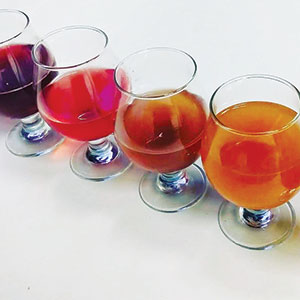The taproom at Lazy Duck Brewing is hard to findit’s a small windowless space tucked in an otherwise unremarkable industrial area in north San Jose.
But the brewers here aren’t after any awards for ambiance. Local beer lovers seek out Lazy Duck because of their ever-changing, often experimental brew list heavy on fruity sour ales with an IPA or two thrown in for the sake of tradition.
During Silicon Valley Beer Week, the beer lovers behind Lazy Duck Brewing will participate in a Meet the Brewers event at Nom Burger in Sunnyvale on Wednesday, July 24. Four days later, they’ll play host at their garage-size taproom for the latest in the series Summer Sunday Sours.
Lazy Duck first opened its doors to the public in April 2018 after a soft launch for friends and family. The brewersJon Chin, Mike Rayzman and Nick Fodorset out to explore the emerging world of sour ales, which depend largely on bacterial cultures to produce a distinctively tarty taste. Since then, Lazy Duck has established a handful of signature sours, each to highlight the flavor profiles of particular fruits: Raspberry Quack, Strawberry Quack and Blackberry Quack. In the competitive Bay Area market, Lazy Duck is looking at fruit-based sours as their lane to success.
“What we’re after is the essence of the fruit in beer form, basically,” said Rayzman, who characterizes himself and his partners as “beer nerds.”
Though fruity sours form the backbone of the new brand, Lazy Duck is also a kind of a lab for experimental flavors. In recent weeks, it has been offering such eye-opening brews as Cake For Breakfast (coconut, cacao nibs and vanilla) and an Horchata sour, based on the popular Mexican treat.
Sour ales aren’t new, but they are enjoying a moment of interest for both brewers and drinkers, partly because they represent a change-up from standard hoppy IPAs and because sours have proven to be adaptable and versatile enough to seduce the more adventurous beer lover.
Sours usually take a longer time to brew than standard beers. Those aged in oak barrels can take a year or more to mature. Lazy Duck sours take about a month from start to finish. “We do a quick sour method,” says Rayzman. “You make a brew just like with any beer, and instead of putting yeast in it, we put in a souring agenta wild culture that we keep alive over time, kind of like a sourdough starter.”
The culturemade up of bacteria, mostly lactobacillus, brettanomyces, pediococcus or other organisms and wild yeaststechnically can change according to factors such as weather, time and location, which potentially adds an element of volatility to brewing. “Our starter is a wild starter,” says Rayzman, “open to the air and the elements a little bit. So, it’s a wild fermentation process. But we’re pretty consistent” from batch to batch.
Sour beers may be trendy today, but they harken back to a time when the scientific method had not so thoroughly integrated with the world of brewing. Before widespread pasteurization, almost all beer was sour beer, subject to fermentation by any number of microorganisms. In the late 19th century, pasteurization allowed brewers to exercise control over how their brews fermented, and the unpredictable nature of the effect of “wild” organisms in beer was all but eliminated. Belgians pioneered the modern sours with their method of using open fermenters, allowing whatever microorganisms that happen to be in the air to affect the fermentation. Ideally, this means that the taste of a particular sour beer is as unique as the place where it is brewed. Some breweries, like Yeast of Eden in Carmel, market their sours as a unique taste of a certain regionwhat vintners would call terroir.
At the Nom Burger event, the Lazy Duck brewers will bring many of their signature sours, some of which are bottled and sold at the Lazy Duck taproom. But at its July 28 Summer Sours party, the brewery will be more experimental, offering up some of their most adventurous ideas.
“We’ll have five brand-new sours that we’re piloting,” Rayzman says. “It’s how we do R&D. We make a big batch of beer, separate it into kegs of these pilot batches and see how they turn out.”
Some of the things they’ll be trying out have to do with tropical flavors: passionfruit, mango, guava, apricot, white peach, cherry lime. “We’re also working on a stout that we’re calling ‘Vanilla Cuppa Jose,'” Rayzman says. “It’s a coffee stout.”
After a year and a half in business, Lazy Duck is still very much a grassroots startupthree partners, no employees, selling their brews to a limited number of local bars and at their tiny taproom, and currently open to the public only on Fridays, Saturdays and Sundays.
Rayzman sees a viable path to success in the Bay Area, which he says is not as brewer-centric as places like Portland, San Diego and Denver, despite the bigger population. “It’s getting more and more crowded, for sure. I think in San Jose, we’ve gotten 10 or 12 [new breweries] coming just recently. But there are still not as many as in other cities. There’s still room to expand. But right now, as a startup brewery, we’re going to focus on the beer. If that proves itself, then we’ll talk about expanding.”
Meet The Brewers: Lazy Duck
Jul 24, 5:30pm
Nom Burger
251 W Washington Ave, Sunnyvale
Summer Sunday Sours
Jul 28, 7pm
Lazy Duck Brewing Taproom
1723 Rogers Ave, San Jose
svbeerweek.com




